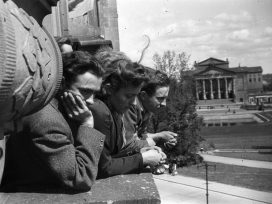The very existence of the private, internationally renowned Central European University (CEU) in Budapest is under threat. Following attacks by the state controlled Hungarian press, a newly drafted law was passed on Tuesday 4 April by the Parliament that will extensively curtail the autonomy of the university, and indeed in effect aims at its closure. The CEU, which embodies the liberal spirit of its founder George Soros, is an attractive place to study for masters and doctoral students in the humanities and social sciences from Hungary and throughout eastern and central Europe, as it is for young scholars from all over the world. This makes it a thorn in Viktor Orbán’s flesh. In an ‘illiberal state,’ as Orbán’s himself describes the political system of his country, there can be no room for cosmopolitan, free thought.
While the new Legislation on the Regulation of Private Universities does not mention the CEU by name, it is nevertheless clearly tailor-made to it. The Andrássy University in Budapest, which has been supported by Austria and several German states, was carefully excluded from the purview of the legislation. The law requires, among other things, that a university maintain a campus in its country of origin, which, it is well known, is not the case for CEU. The CEU must comply by these conditions by January 2018 or cease functioning in Budapest. Orbán has succeeded in enforcing his new media regulations by means of similar legislation, which serve to obscure the authoritarian regime of control that is being established in Hungary. Will the EU tolerate this attack that calls into question the very freedom of thought and knowledge while rejecting the fundamental values of the Union?

Image: @istandwithceu
Although this new amendment directly targets the CEU, the attack must be viewed in the context of the systematic erosion of the autonomy of all universities in the country. Since 2006, Hungary has spent less and less on education both in real terms and as a percentage of the GDP. Only Mexico and Turkey spend less among OECD countries. Large funding cuts to Hungarian state universities have created a budget deficit that has made it increasingly difficult to maintain their operations. The result of this fiscal policy has been the closure of many departments, and those that remain are entirely financially dependent on the benevolence of the state. State expenditure on higher education also declined by 25% between 2010 and 2013. This led to the establishment of a financial state of exception, which provided the occasion for the installation of state-nominated ‘chancellors’ at each university, in order presumably to consolidate the financial situation. Many of these chancellors are former FIDESZ functionaries with no expertise in financial management, and yet who are not only making financial and managerial decisions, but also determining academic appointments.
Another indicator of the malaise fallen over Hungarian education policy is the alarming decline in student applications and enrolments between 2010 and 2014, which fell by 24%. In 2016, the number of applications to state universities declined at en even sharper rate, from 160,000 to 110,000. This dramatic reduction amounting to a fall of 45% in student applications has been undertaken deliberately by the government. The less privileged, who are denied access to the education system in favour of middle and upper middle class students, are to fit themselves into Orban’s hierarchical corporate system as ‘simple labourers’ in the service or industrial sectors.
Cuts to high-school programming, the reduction of the compulsory schooling age to 16, and the attempt to place students into vocational schools by the age of 14, are all part of the strategy to hinder social mobility and equal opportunity. CEU, on the other hand, aims to provide broad access to education by granting scholarships on the basis of academic excellence and demonstrable need. While Hungarian universities will increasingly be forced to withdraw from the Bologna Process due to the introduction of numerous measures detrimental to the mobility of Hungarian students within Europe, the CEU has been enormously successful in securing prestigious and highly competitive third-party funding through the European Research Council. Instead of following the path paved by the CEU towards the internationalization of knowledge, the Hungarian government is committed to a nationalization of science and its political control.
To this end, the government founded and generously funded the National University of Public Service, intended to serve as the training ground for the new cadres of the regime. The governor of the Hungarian National Bank has also received permission to utilize the bank’s public resources to establish a new economics university in his hometown of Kecskemet, where his own theoretical work is to be part of the curriculum. In contrast, a new accreditation regulation was passed which undergirds the legality of government interventions into the autonomy of universities. As a result, all universities are now obliged to obtain prior consent from the Ministry of Human Resources whenever a new course of studies is proposed to the Hungarian Accreditation Committee – a body that is autonomous only on paper.
All of these measures are likely to persuade those thousands of talented students and outstanding scholars who have already left Hungary not to return. In this way, one is rid of unwelcome critics. A devastating report by the OECD in 2016 pointed to serious deficiencies in the quality of Hungarian universities. Instead of working to counteract this negative trend, the new legislation aims to bring CEU, which boasts an excellent international reputation and has consistently delivered top research performance, to its knees and ultimately render it incapable of pursuing its mission. For a country like Hungary, which lacks natural resources but has many outstanding academics across scholarly fields, one could hardly imagine a more short-sighted political decision. Can the timing of Orbán’s advance be coincidence, when only last week the European University in St. Petersburg was forced to close because its license was withdrawn by Russian authorities? If the Hungarian government sticks to its plans, this ambition to nationalize science under state control will come at a high price.
Correction: An earlier version of this article stated that the Gender Studies MA programme at the Eötvös Loránd University (ELTE), Budapest, had failed to receive accreditation by the Hungarian Ministry of Human Resources. It considered the establishment of a new gender studies programmes at Hungarian universities to be highly unlikely. Fortunately, it turns out that this is not the case. While the Gender Studies programme at the ELTE was heavily criticized by leading politicians at the ministry of human resources in early March 2017, and while so-called ‘family studies’ such as is taught at the Corvinus University are preferred by the current government, the former will now admit its first cohort of students in Autumn term 2017.







